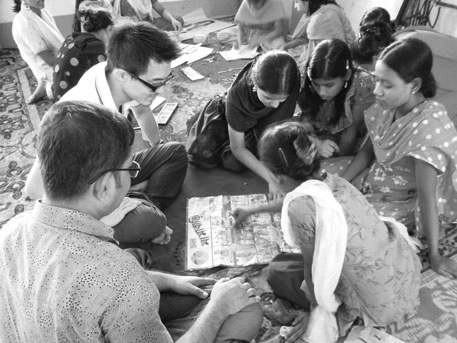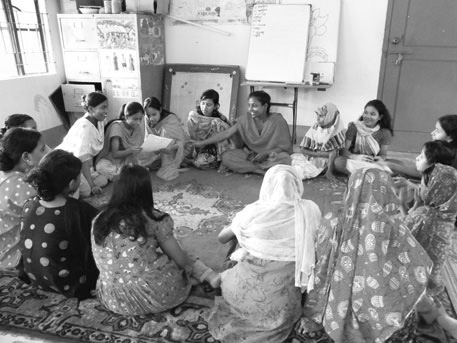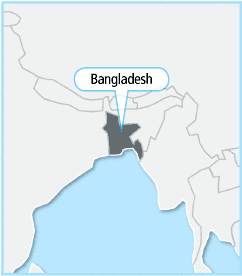Japan's Official Development Assistance White Paper 2010
Column 8 Providing Opportunities for Education
and Promoting Self-Empowerment
— Support for Girl Household Employees
in Bangladesh —
Bangladesh is one of the poorest countries in the world. Here, it is a challenge to provide assistance to children. While many organizations support street children, the majority of beneficiaries are boys. A Japanese NGO, SHAPLA NEER, having concern about where poor girls are in Bangladesh, conducted a survey and is now carrying out a project in cooperation with the Government of Japan to support girls who are household employees in the capital city of Dhaka (*1). Mr. Nobutada Sugahara, SHAPLA NEER officer based in Bangladesh, is heading this project.
When Mr. Sugahara was a university student, he learned about the north-south problem and felt shocked and angry. Thus he decided to pursue his career in international cooperation, and studied at the Graduate School of International Cooperation Studies, Kobe University. After he worked for a private firm, he joined SHAPLA NEER in 2008 and since May 2010 has been based in Dhaka.
Mr. Sugahara and his colleagues started off by finding ”invisible girls” who need assistance. While the project is actually implemented by SHAPLA NEER and its affiliated local NGOs, it is no simple task to find girls who are working inside residences. Thus they decided to firstly look for cooperative employers/masters who hired girls, and then they gradually increased the number of such employers/masters.
Nevertheless, at first, the employers/masters were reluctant to understand the purpose of this project, and the NGO staff were often rejected by them at the door. Mr. Sugahara said, ”It was difficult work, but I encouraged NGO staff members to build trust with the community members and the employers/masters of the girls. And to ensure this, I and other SHAPLA NEER staff members try hard to build trust with those NGO staff members by ourselves.”
As they made such visits continuously with the spirit of never giving up, the number of employers/masters who came to understand the purpose of the project gradually increased, and it became clearer where the girls who need assistance were.
Mr. Sugahara and project staff members negotiated with those employers/masters, and urged them to allow the girls to study and receive vocational training at the SHAPLA NEER support center. There, with a view to empowering the girls for their future, they can learn various skills, such as reading, writing, and calculating, and they can also receive vocational training, including ironing, cooking, and sewing with sewing machines.
Thanks to the joint efforts made by Japanese and Bangladeshi NGOs the girls were allowed to go to support centers. However, in order for the girls to continuously study and receive vocational training, NGO staffs must persistently and diligently persuade employers/masters. Mr. Sugahara says, ”The number of our visits to the employers/masters and the attendance rate of the girls to the support centers are clearly correlated. Therefore, we never stop visiting the employers/masters.”
Girls who acquired literacy and received vocational trainings at the support center, gradually came to stand up by themselves. Some girls negotiated with their employers/masters, saying, ”As I can do better ironing and cooking than before, please raise my wage,” and convinced them to agree.
Saying that, ”The girls need to have confidence to stand on their own feet,” Mr. Sugahara entrusts his hope to the increasing girls, who have became more active than before, brimming with self-confidence.
*1 Grant Assistance for Japanese NGO Project (Community based Project for Girl Domestic Workers [January to December 2010])

Girls learning how to use the education material (second from left, Mr. Sugahara) (Photo: SHAPLA NEER)

Girls sharing their experiences at the support center (Photo: SHAPLA NEER)

